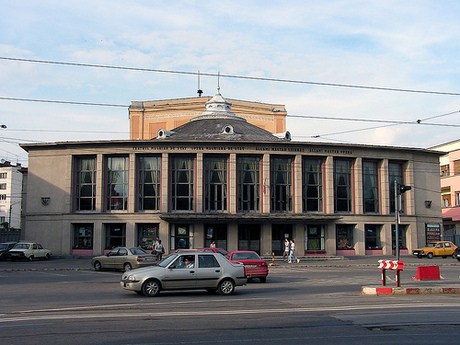Hungarian State Theatre
The Hungarian State Theatre and Opera House is among the most reputable cultural institutions of the Hungarians in Romania. The first theatrical representations in Cluj go back to 1792, when they were held in the Rhedey Palace. As a consequence of the cultural revival at the end of the XVIIIth century, the modern theatrical performances demanded an appropriate place. Inaugurated in 1821, the new building, which met the highest European standards, would make Cluj the capital city of the Hungarian performances. It also staged Shakespeare’s works for the first time and other valuable plays.
The Hungarian Theatre of Cluj was founded in 1792 and was the first Hungarian theatre company in Transylvania. Transylvania is now part of modern day Romania, and the Hungarian Theatre of Cluj functions as a repertory theatre, entirely subsidized by the Romanian Ministry of Culture and National Heritage. Performances are presented in Hungarian, with simultaneous translation into Romanian or English usually available. The defining periods of the theatre were shaped by directors of international fame who are considered key figures of Hungarian and European theatre, including Gyula E. Kovács, the initiator of the Shakespeare-series, Jenő Janovics, founder of the first Hungarian film studio, and György Harag, a great Maestro of the theatre in Romania. In 1990 Gábor Tompa was appointed artistic director of the Hungarian Theatre of Cluj. Under his leadership, the theatre has continued Harag's tradition of innovation, based on a repertoire that includes classic masterpieces as well as contemporary plays. During the last 20 years the Hungarian Theatre of Cluj has aligned with the new trends of contemporary theatre and taken its place in the circuit of European theatres. This has been largely due to international co-productions and collaborations with world renowned professionals: directors such as Vlad Mugur, Silviu Purcărete, Andrei Şerban, Mihai Măniuţiu, Victor Ioan Frunză, David Zinder, Dragoş Galgoţiu, Patrick Le Mauff, and Elie Malka; set and costume designers such as Carmencita Brojboiu, Andrei Both, Doina Levintza, Lia Manţoc, and Helmut Stürmer; and composers such as Vasile Şirli and Iosif Herţea.
In 2007, on the 215th anniversary of its existence, the Hungarian Theatre of Cluj successfully hosted the INTERFERENCES International Theatre Festival, with 12 productions from 7 countries. The following April, the theatre was accepted as a full member of the Union of the Theatres of Europe and in the fall of 2008 the Hungarian Theatre of Cluj, together with the Bulandra Theatre from Bucharest, hosted the 17th Festival of the Union of the Theatres of Europe. Its outstanding internationally acclaimed performances and its organization of important theatrical events combine to make the Hungarian Theatre of Cluj not only an important institution for the Hungarian community in Romania, but one of the most important theatrical institutions for the country as a whole.
The present-day building, on the right bank of Somes River, was erected in 1909 on the location of the former Summer Theatre, in Secession style, based on the plans of architects Markus Geza si Spiegel Frigyes. The front with columns and the foyer of the institution were reshaped in 1960.
Since the end of the Second World War, the new building is the only Hungarian State Theatre and Opera House outside Hungary. Gyula E. Kovacs, the initiator of the Shakespeare-Series (1865-1899), Jeno Janovics, founder of the first Hungarian cinema studio (1905-1930), and Gyorgy Harag, a famous director, (1973-1985), left their marks on the Hungarian and European dramatic representations.
Since 1990, under the leadership of director Tompa Gabor, a representative of the Romanian school of directors, the theatre continues Harag's tradition of innovation, based on a repertoire including classical and contemporary masterpieces and a troupe of five generations of actors. The theatre boasts performances directed by famous Romanian and international directors, as Vlad Mugur, Silviu Purcarete, M. Maniutiu, Victor I. Frunza, Mona Chirila, David Zinder and David Grant.
Over the latest 15 years, The Hungarian State Theatre in Cluj was rewarded with important national and international awards for the performance with The Bald Prima Donna (directed by Tompa Gabor), winner of the Best Foreign Performance Award of the Year 1993 in the UK, as well as with three Romania's most important theatre awards, conferred by the Romanian Theatre Association (UNITER) for the best performance of the year. Numerous nominations and more than 110 national and international awards praise the efforts of directors Gabor Tompa, Vlad Mugur, Mihai Maniutiu, as well as of the designers and actors of the Theatre.
The Cluj Hungarian Opera, which shares the building with the Theatre, was established more recently, in 1948, having previously staged operettas. The Opera underwent a rejuvenating process after the 1990 revolution, when many talented youngsters entered the chorus, orchestra and ballet ensemble.
The 60 titles that make up the Hungarian and Romanian opera, ballet and operetta repertoire include both works from the international repertoire, to mention the works of Verdi, Bizet, Mozart, Strauss, as well as the creation of classical and contemporary Hungarian composers: Erkel Ferenc, and Vermesy Peter, Vajda Janos, Komives J., Orban Gyorgy and others. Other operettas of Franz Lehar, Imre Kalman, Albert Szirmai, Jeno Huszka add to the valuable collection of titles.
The Cluj Hungarian Opera House was the host of the first “Bela Bartok” International Festival and contest of the orchestra conductors, in June, 2005. 40 orchestra conductors from 23 countries participated in the event.


